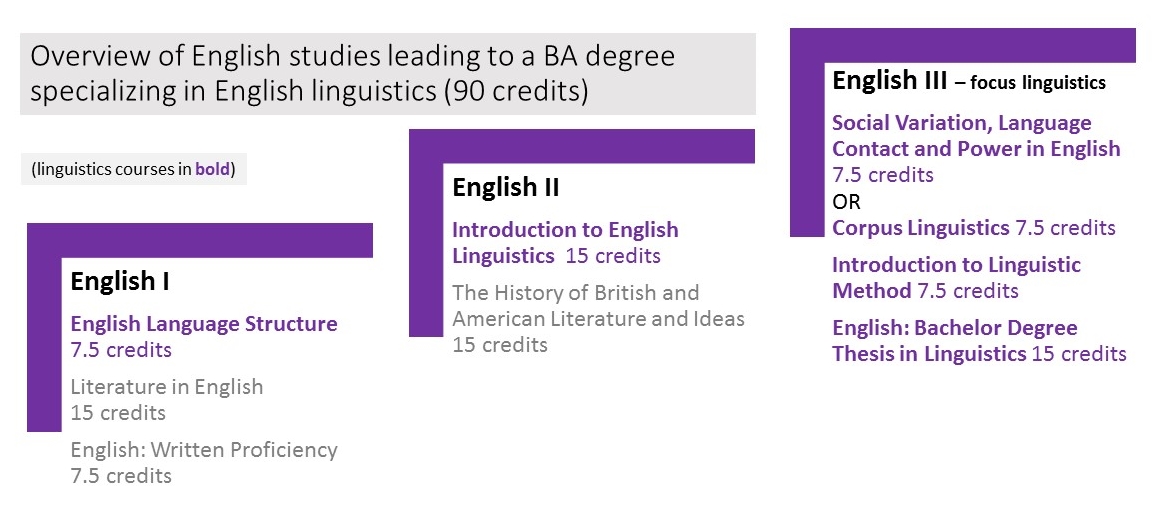What is linguistics?
Linguistics is the study of language. The study of language gives you the tools to be able to see beyond the message. You develop a skill set that is indispensable in today's society where many people not only have access to information, but they can also produce and spread information to a global audience. You develop a set of analytical skills for working with spoken, written and technology-mediated language in different settings. You also learn how to communicate ideas clearly—and in ways that are adapted to different genres and different situations.
Linguistics is a broad area of research, because language is such a complex phenomenon involved in and relevant to many different types of human activity. This means that linguists have a range of different areas of specialisation. For example, a linguist can focus on the sounds of speech (phonetics), on the meaning of words (semantics), or how words are combined to form larger units like sentences (syntax). In addition, linguists can study how human cognition works (psycholinguistics), how languages are acquired and learned (language acquisition, English Language Teaching) and how language works in social settings (sociolinguistics). Some linguists take a historical perspective and look at language change and development (historical linguistics), while others stay in the present and consider for example how new technologies and language interact (in computer-mediated communication). Many of these areas are covered in our linguistics courses, but far from all of them, as the possibilities for studying language are seemingly endless.
Language Studies: Focus English
The linguistics courses in our department focus on the English language specifically. English has a unique position not only as a first language in many countries but also a lingua franca, in addition to its function as a second language in many speech communities around the world.
Our Undergraduate Courses in Linguistics
As a student with us, you encounter English linguistics in their first term of study at the undergraduate level. In the first term (English I), we look at the structure of English including its grammar and sound system as well as stylistic variation. This is followed by an introduction to the main branches of linguistics in the second term (English II). Finally, in the third term (English III) students who choose a linguistics specialisation learn how to do research. This involves critical thinking, which we find is more important than ever. The specialisation includes a foundational course on methods used in the study of language, giving students the practical skills to do research in standard and justifiable ways. Students also take a course focusing either on language and social variation or on language use studied through digital tools. Building on these courses, students finish their third term by presenting an independent linguistic study supervised by a lecturer in the department. Previous students have written on a range of interesting topics.
Eleni, T. (2016). Epistemic Modality in Linguistic and Literature Essays in English: A comparative corpus-based study of modal verbs in student claims.
Potter, F. (2018).Linguistic Economy on Twitter: Reduction strategies in Twitter posts before and after the increased character limit.
Waghorn, A. (2014). Swearing in context: Comparing the perceived strength of British English taboo words when presented with and without context.
Åhman Billing, T. (2016). The Female Protagonists in Thackeray’s Vanity Fair: A Corpus Linguistic Study of Keywords, Collocations, and Characterisation.
Östman, K. (2017). Neutral or not?: A study of gender (in)equality in the use of professional terms in English.
Verhoek, S. (2016). The use of the pronouns we, us, and our in political speeches: A comparative study of the inaugural addresses of Bush and Obama.
Eriksson Albacke, S. (2015).The Media and Ferguson: Descriptions of the authorities and the demonstrators in the reporting of the riots in Ferguson.
Kitano, L. (2015). Framing of Muslims and Islam in the British Press : A Comparison of The Times and The Daily Telegraph.
Martinez, M. (2016). The Correlation Between Google Scholar Rankings and Readability and Cohesion of Texts in Linguistics.
Overview of our Bachelor of Arts (BA) Degree in English Linguistics
This is what your programme will look like if you study three terms of English with a focus on linguistics. 
In the diagram, the linguistics courses are marked in bold and amount to 52.5 credits out of a total of 90 credits in English studies. Students enrolled in a teacher training programme will follow modified versions of this general path. (Note that a Bachelor of Arts degree typically requires three years of full-time study, for a total of 180 ECTS credits, with at least 90 credits in the major or main subject.)
Our Master's Programme (MA) in Applied English Linguistics
On successful completion of these courses, including 90 credits in other subjects of your choice, you are eligible to apply for a Bachelor of Arts degree (BA) specializing in English linguistics. A BA in English linguistics provides a solid foundation for a wide variety of professions. Some of our graduates work in teaching, publishing, journalism and as librarians. Others go on to further study. With a BA in English linguistics, you can apply for our one-year Master Programme in Applied English Linguistics. This degree programme goes deeply into different areas and controversies within applied linguistics, such as the role of English in the world or the role of authenticity in language teaching. Again, our research interests shape this programme: we study how language functions and how it is used—in writing, in speech, or electronically; how language users adapt to different communicative contexts; how different groups of speakers, especially in an academic context, use and develop their language, among many other topics.